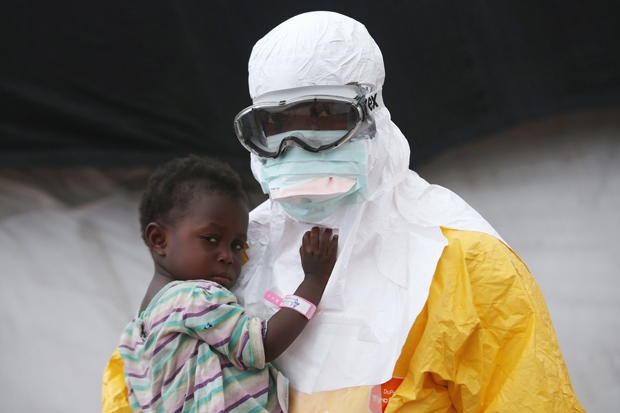There is something depressing about the fact that it has taken a sick Spanish nurse to put Ebola back on the front pages. Since the summer, some 3,400 West Africans have died, but interest in the story here had waned. So long as the disease did not make the nine-mile leap across the Straits of Gibraltar, the moat which keeps all nasty things from Africa at bay from fortress Europe, a sense developed that it could quietly be forgotten — or left to the aid charities.
No longer. Spain’s public health authorities are investigating how a nurse who treated two missionaries in a Madrid hospital — who had contracted the disease in Liberia and Sierra Leone — became infected in spite of the protective clothing she was wearing. The nurse had been on holiday since treating the now-deceased missionaries and it is not clear where she had gone, but it seems likely that she contracted the illness through an as-yet unidentified breach in the barrier nursing techniques used to treat patients.
We have become used to these panics in recent years. Sars and bird flu were both grimly forecast to cause mass fatalities. Six years ago, the government rather hysterically warned that the next pandemic would cost up to 750,000 lives in Britain and 50 million worldwide. ‘Socio-economic disruption will be massive,’ it concluded. But we have, so far, been spared. Until July this year just 393 people worldwide have died of bird flu, not one of them in Britain.
Ebola has already proved more deadly than bird flu or Sars (which has killed 775 people worldwide). Yet apocalyptic forecasts are again likely to prove wide of the mark. We are not ‘overdue’ a global pandemic of infectious disease, as Professor Roy Anderson, chief scientist at the Ministry of Defence, put it in 2005. They are not like hurricanes. The world, and the developed world in particular, is now largely free of the major outbreaks of infectious disease which have punctuated history not through luck but because we have become much better at controlling them. What we cannot treat through inoculation we have become extremely good at containing through palliative care.
Ebola, the current outbreak of which has a mortality rate of 70 per cent, is about as lethal a disease as can be. It still has no cure. But there has been a procedure for isolating and treating it in operation since 1976, when a government scientist at Porton Down accidentally pricked his finger and gave himself the disease. He survived, as did the British nurse William Pooley, who recently contracted the disease while working in Sierra Leone. In neither case was anyone else infected. If cases do arise in Britain there will inevitably be deaths, but there is little reason to believe that the outcome will not be the same: successful containment. The idea of Britons being infected en masse is fanciful; the disease is not airborne and spreads through contact of bodily fluids only.
All this ought to be self-evident, yet it is lost on those who prefer to see outbreaks of infectious disease as some kind of payback for modern lifestyles. Typifying this attitude, an organisation called the Eco Health Alliance claimed last week that Ebola is a product of ‘deforestation, travel and trade’ — all the evils of global capitalism, in other words. Other than the obvious — that human travel takes a disease to places it would not otherwise go — it is utter nonsense. Global capitalism has not put us under greater threat of infectious disease. Quite the opposite — it has fuelled the economic growth which pays for hospitals of developed-world standards and for the sanitation which prevents spread of infectious disease. Similar claims were made at the beginning of the railway age: that rapid travel would spread all kinds of disease around the country. We know what followed: a century and a half in which infectious disease was all but eliminated as a major killer in Britain.
So long as developing countries are allowed to prosper and to adopt western lifestyles they will enjoy the same transformation. It is just a tragedy that so many of those who claim to speak on behalf of the world’s poor seem intent on interrupting that process and keeping the greater part of the Earth’s population in a state of noble — and deadly — peasanthood. Does the green movement seriously think that the lives of West Africans would be improved by curtailing travel and trade, and by prohibiting agricultural improvement and other development in forested areas? It is as well that the same attitude did not prevail in Anglo-Saxon England, when much of the countryside here was deforested.
We are seldom impressed with the Department for International Development’s activities — they too often feed green ideology by pouring money into projects that keep poor societies dependent on subsistence farming. But its latest project we enthusiastically endorse: the construction of a 92-bed hospital in Sierra Leone, along with generators and incinerators, which will bring something approaching western-standard nursing to the country as it confronts Ebola.
This is exactly what aid should be about: pouring in resources in times of crisis. Quite apart from the humanitarian aspect — which on its own would make the project worthwhile — it is obviously in our interests to tackle the threats posed by infectious disease at their source. Fewer hare-brained schemes to promote sustainable sharecropping in sub-Saharan Africa and more pop-up hospitals would make the world a happier and safer place, and set us on the path to the realistic goal of eliminating infectious disease as a major killer worldwide.






Comments